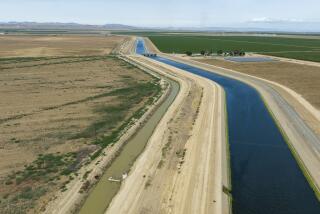U.S. OKs Reduced Salmon Season
- Share via
SACRAMENTO — Commercial salmon fishing along the West Coast could grind nearly to a halt this year under federal regulations adopted late Friday, threatening to swamp struggling fleets and virtually assuring higher prices for fresh fish.
Federal regulators said the stiff restrictions were needed to ensure that enough chinook salmon return to reproduce this fall in the beleaguered Klamath River, once among the West’s mightiest spawning grounds but now the most imperiled.
“This decision is important to our efforts to help rebuild and improve conditions for Klamath chinook salmon for the long term,” said William T. Hogarth, assistant administrator at the National Marine Fisheries Service, the agency that adopted the catch restrictions.
Federal officials estimate that the weekly catch limit and a shortened season along a 700-mile swath of ocean off Oregon and Northern California will combine to reduce the catch to about 40% of normal.
But commercial fishermen say this year’s harvest of chinook -- the marketplace mainstay of the West Coast fishing industry -- could dwindle to just 10% of a normal year, pushing many of them out of business.
“It’s going to mean treading water at best and at worst simply working toward bankruptcy,” said Duncan MacLean, a fisherman out of Half Moon Bay, Calif.
Under the new regulations, commercial fishermen will be allowed on the water just nine weeks instead of the usual five or six months, and their weekly catch will be limited to 75 fish. A well-run fishing boat can catch more than that in a day.
The National Marine Fisheries Service decision, announced in Washington just days before the May 1 start of salmon season, virtually rubber-stamps a recommendation made earlier this month by its West Coast advisory panel, the Pacific Fisheries Management Council.
Hogarth said the decision was “scientifically sound,” the result of a painstaking process that drew a variety of groups concerned over the fish’s fate.
But fishermen such as MacLean said the action was anything but fair -- especially the decision to limit commercial fishermen to 75 salmon a week. The fisheries management council introduced that limit right before its vote, adopting it without public discussion.
“It’s a process gone awry,” MacLean said.
California Rep. Mike Thompson (D-St. Helena) said the decision reflects the Bush administration’s willingness to side against coastal fishermen and with farmers in the Klamath Basin, a fertile swatch of more than 200,000 acres on the Oregon-California border irrigated by the river’s water.
“They have little to no concern for the impact this has had on folks in the coastal communities,” Thompson said.
The river, which emerges from the snowmelt of Oregon to empty into the sea north of Eureka, Calif., has endured five years of drought and a vitriolic water war in 2001 seen as a fight between farming and fish.
In 2002, the Bush administration began diverting more water to agriculture. Those lower river flows were blamed by environmentalists for the die-off of more than 70,000 returning adult chinook that fall.
A quarter-century ago, more than 8,000 fishing vessels operated off California and Oregon. Today there are fewer than 1,000. Income from salmon caught off the coast fell from $243 million in 1988 to $57 million last year.
With an even bigger decline this year, fishermen expect prices to jump by more than 50% from last year.
More to Read
Sign up for Essential California
The most important California stories and recommendations in your inbox every morning.
You may occasionally receive promotional content from the Los Angeles Times.










